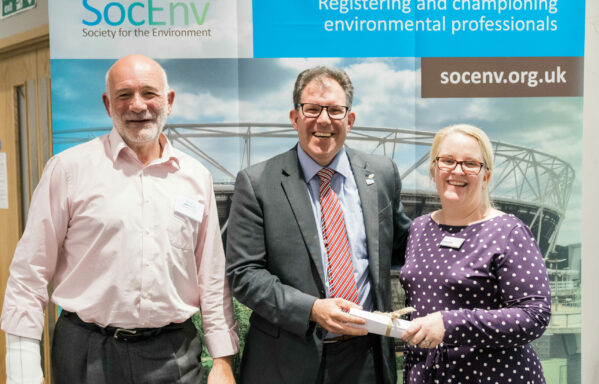At the Society we recognise that maintaining and upholding professional quality is essential to the effective delivery of green jobs; to provide the best possible service to clients and the public, and to ensure that practitioners adhere to ethical and responsible practices.
By Dr Emma Wilcox FIMMM CEnv
SocEnv Chief Executive

Green jobs: the benefits
According to the Green Jobs Taskforce, a ‘green job’ can be defined as “employment in an activity that directly contributes to – or indirectly supports – the achievement of the UK’s net zero emissions target and other environmental goals, such as nature restoration and mitigation against climate risks.”
The need for increased green jobs is imperative as they not only address the pressing issue of climate change but also stimulate economic growth, whilst fostering a more sustainable and resilient global workforce. Green jobs are essential for achieving long-term environmental goals and creating a cleaner, more sustainable future for our planet.
The need for quality green jobs
Quality must always be a top priority when creating a large number of new jobs and the government has committed to deliver two million green jobs in the UK by 2030. At the Society we recognise that maintaining and upholding professional quality is essential to the effective delivery of green jobs; to provide the best possible service to clients and the public, and to ensure that practitioners adhere to ethical and responsible practices.
Going beyond simply the need for green jobs is an essential element which can’t be overlooked; green jobs must be of an excellent quality. They should be jobs that people want to do, underpinned by a high level of training provision.
In a nutshell, green jobs must meet professional standards, so those employed in green jobs can demonstrate competent practice through their skills, knowledge, and behaviours. This means regular CPD, training, and recognising the quality of the workforce through professional registration. In meeting this criteria, a quality green job is driven by the latest evidence-based knowledge and skills. Therefore, quality green jobs provide an antidote to the threat posed by greenwashing.

Professional standards in practice
Individual professionalism
There are more than 8,000 professionals holding one of our registrations: Chartered Environmentalist (CEnv), Registered Environmental Practitioner (REnvP) and Registered Environmental Technician (REnvTech).
Anyone who holds one of our registrations, regardless of the discipline or sector in which they work, has proven environmental competence. To become a CEnv, REnvP or REnvTech, professionals must prove environmental competence by demonstrating their:
- Knowledge – up to date and peer verified
- Skills – leadership and communication
- Behaviours – ongoing CPD commitment and code of professional conduct.
As a result of having proven their competence, being a registered environmental professional helps to provide assurance of competence to employers, clients, and stakeholders – tackling the problem of greenwashing head-on.
Employer professionalism
Our Employer Champion programme recognises organisations for investing in green jobs with professional standards at their core. These employers have demonstrated a commitment to supporting, developing, and truly valuing the environmental professionals they employ and work alongside. Valuing professional registration from a senior level, they support their staff through their ongoing professional development, including the process of gaining CEnv, REnvP or REnvTech registration.
The benefits of this investment in staff professional development reach the individual and employer. For example, through growing credibility and opportunity, but also wider society as we urgently need experts to thrive and lead the way to a more sustainable future.

Be part of the solution
To ensure all green jobs are underpinned by professional standards, we call on individuals, employers and decision-makers to act:
- Current CEnv/ REnvP/ REnvTech professionals: you are already demonstrating your commitment to professional standards, which is fantastic! To increase your influence further, consider sharing your good practice and career experience with others. This could involve sharing your expertise as part of a blog on our knowledge hub or appearing on EnvCast.
- Aspiring CEnv/ REnvP/ REnvTech professionals: gain professional registration and help tackle greenwashing by ensuring it’s those with proven environmental competence that are leading the way.
- Employers: encourage your staff to gain professional registration. If you’ve not already, consider becoming an Employer Champion and demonstrating your commitment to the professional development of your staff.
- Government and other decision-makers: the skills required for green jobs require quality training provision. From upskilling and reskilling the current workforce, to supporting those making the transition to a green job, and investing in the skillset of the future workforce. We recently joined more than 40 organisations and businesses in calling for green skills and jobs to be included in the final cover text agreement at COP28.
Quality green jobs in action
Looking for inspiration? Check out our registrant profiles, monthly podcast series EnvCast and #iamCEnv videos. Here you will find examples of CEnv, REnvP and REnvTech professionals thriving in quality green jobs.

Get involved in Green Careers Week:
Share this page
More from SocEnv

Professional Registration
Interested to find out more about achieving professional registrant status based on your environmental work? CEnv, REnvP and REnvTech info this way...


Become an Employer Champion
Become an Employer Champion to showcase your commitment to developing your employees with environmental knowledge and experience.


Careers & Opportunities
Browse current job vacancies and opportunities, all relevant for aspiring and current environmental professionals.


Environmental Apprenticeships
Equipping aspiring professionals with the necessary knowledge and experience to begin a successful and rewarding career

